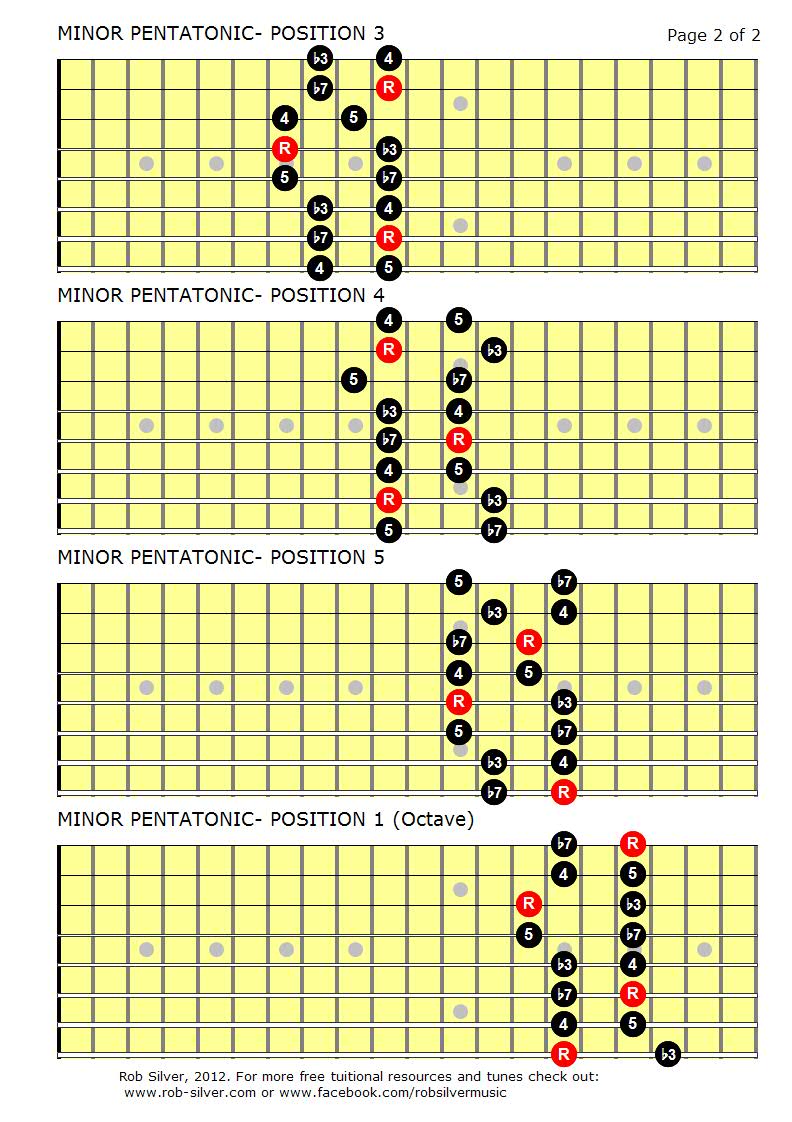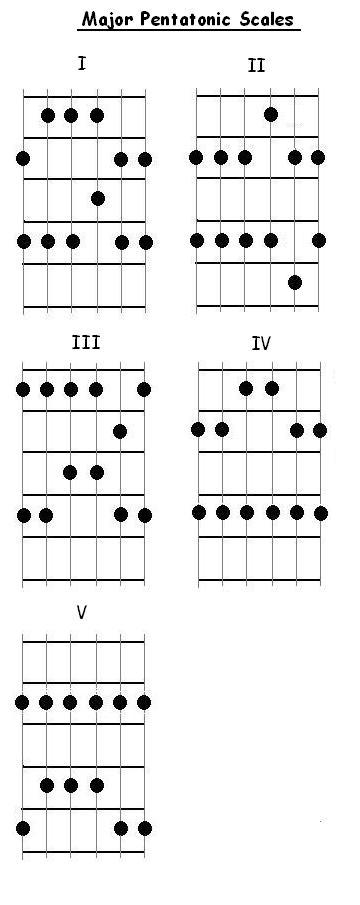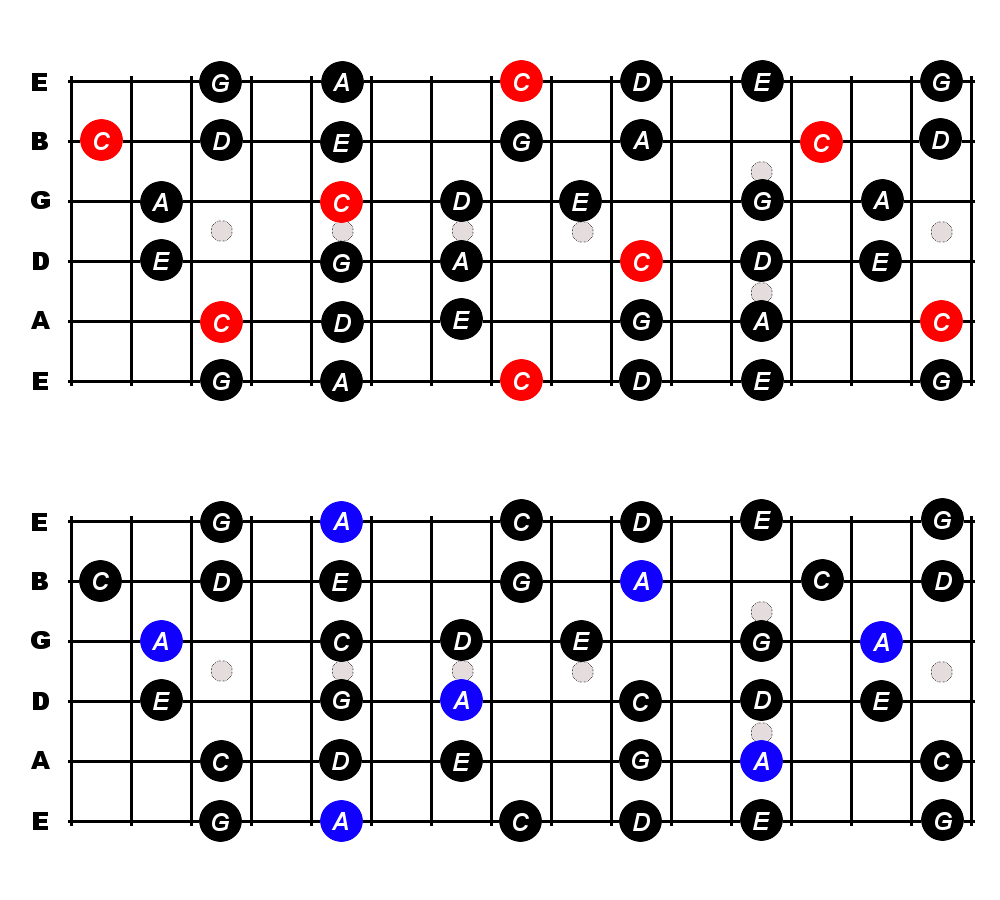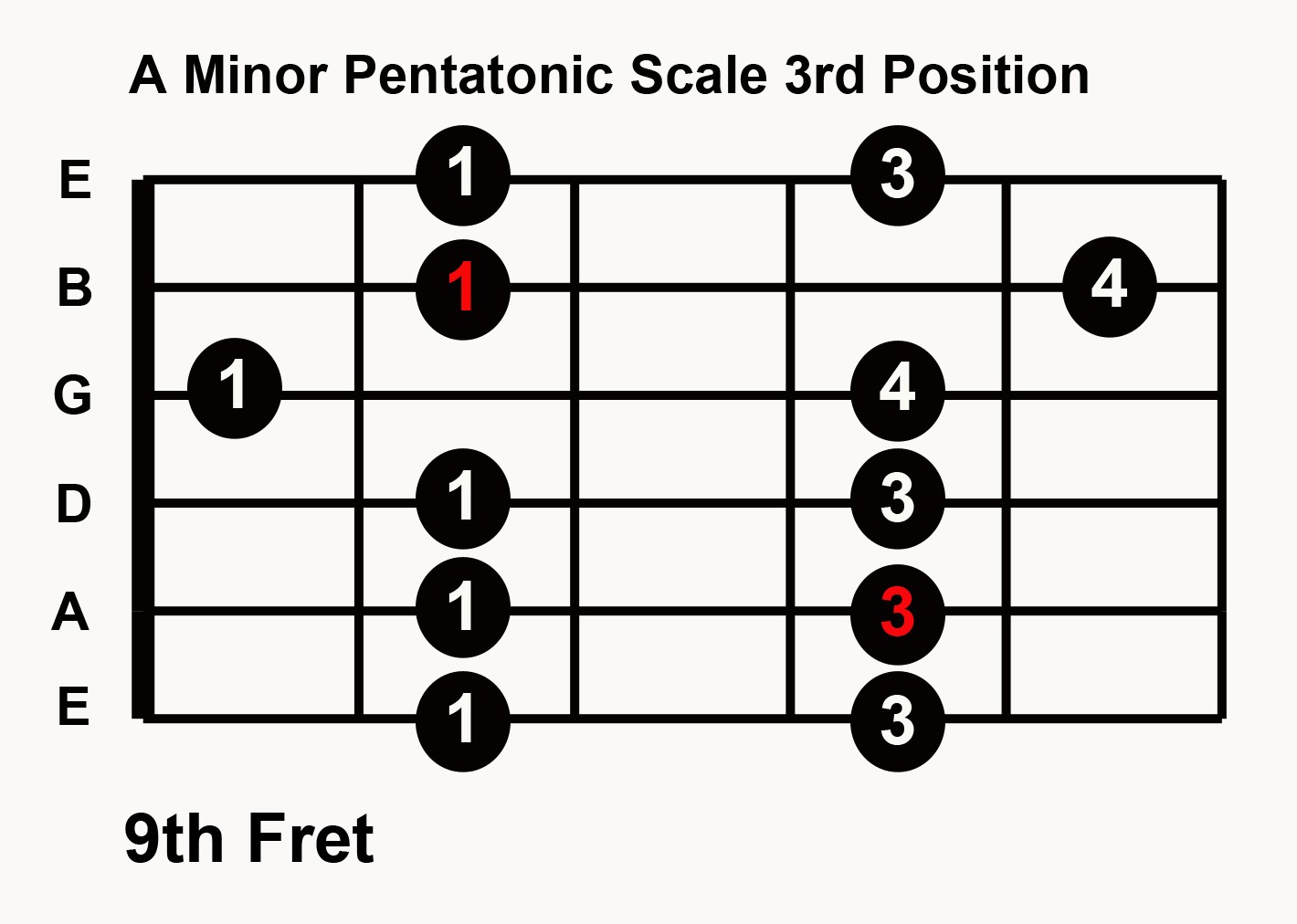Pentatonic Scale Patterns for Guitar
 The pentatonic scale is a fundamental and widely used scale in guitar playing. It is a versatile scale that can be applied to various musical genres, including blues, rock, and jazz. This scale consists of five notes per octave, hence the name “pentatonic,” which means “five tones” in Greek. In this article, we will explore different patterns and positions of the pentatonic scale for guitar.
The pentatonic scale is a fundamental and widely used scale in guitar playing. It is a versatile scale that can be applied to various musical genres, including blues, rock, and jazz. This scale consists of five notes per octave, hence the name “pentatonic,” which means “five tones” in Greek. In this article, we will explore different patterns and positions of the pentatonic scale for guitar.
Minor Pentatonic Scale for Guitar
 The minor pentatonic scale is one of the most commonly used scales in guitar improvisation. It is often associated with the blues genre, but it can be used in various musical contexts. The minor pentatonic scale is derived from the natural minor scale and consists of the root, minor third, fourth, fifth, and minor seventh intervals. Mastering this scale will greatly enhance your ability to create melodic and expressive guitar solos.
The minor pentatonic scale is one of the most commonly used scales in guitar improvisation. It is often associated with the blues genre, but it can be used in various musical contexts. The minor pentatonic scale is derived from the natural minor scale and consists of the root, minor third, fourth, fifth, and minor seventh intervals. Mastering this scale will greatly enhance your ability to create melodic and expressive guitar solos.
The Minor Pentatonic Scale for 8 String Guitar
 For guitarists who play the 8-string guitar, the minor pentatonic scale can be adapted to the extended range of the instrument. The 8-string guitar adds two additional strings, usually tuned to a low register, which allows for a wider range of notes and more creative possibilities. The minor pentatonic scale can be played across all eight strings, utilizing different fingerings and positions, to create unique and heavy guitar riffs.
For guitarists who play the 8-string guitar, the minor pentatonic scale can be adapted to the extended range of the instrument. The 8-string guitar adds two additional strings, usually tuned to a low register, which allows for a wider range of notes and more creative possibilities. The minor pentatonic scale can be played across all eight strings, utilizing different fingerings and positions, to create unique and heavy guitar riffs.
How to Use the Pentatonic Scale in Key?
 Understanding how to use the pentatonic scale in different musical keys is essential for guitarists. The pentatonic scale is a relative scale, meaning that its patterns can be shifted up or down the guitar neck to match the desired key. By learning the five patterns of the pentatonic scale and their corresponding root notes, you can easily navigate the guitar fretboard and play in any key. This knowledge will greatly enhance your improvisation skills and enable you to play with more confidence and musicality.
Understanding how to use the pentatonic scale in different musical keys is essential for guitarists. The pentatonic scale is a relative scale, meaning that its patterns can be shifted up or down the guitar neck to match the desired key. By learning the five patterns of the pentatonic scale and their corresponding root notes, you can easily navigate the guitar fretboard and play in any key. This knowledge will greatly enhance your improvisation skills and enable you to play with more confidence and musicality.
Guitar Pentatonic Scale Patterns
 There are several common patterns for playing the pentatonic scale on the guitar. These patterns are movable, meaning that once you learn them in one position, you can easily transpose them to any other key or position on the guitar neck. By practicing these patterns in different positions, you will develop muscle memory and improve your ability to navigate the fretboard. It is also important to practice playing the scale both ascending and descending to develop fluency and dexterity in your playing.
There are several common patterns for playing the pentatonic scale on the guitar. These patterns are movable, meaning that once you learn them in one position, you can easily transpose them to any other key or position on the guitar neck. By practicing these patterns in different positions, you will develop muscle memory and improve your ability to navigate the fretboard. It is also important to practice playing the scale both ascending and descending to develop fluency and dexterity in your playing.
A Pentatonic Scale Charts for Guitar and Bass
 As a guitarist or bassist, having a visual reference for the pentatonic scale on the fretboard can greatly aid your learning and practice. Pentatonic scale charts are available for both guitar and bass, showing the different positions and fingerings for each note of the scale. These charts allow you to easily visualize the scale patterns and their relationship to the fretboard, making it easier to memorize and apply in your playing. By regularly referring to these charts, you will develop a deeper understanding of the pentatonic scale and its application in different musical contexts.
As a guitarist or bassist, having a visual reference for the pentatonic scale on the fretboard can greatly aid your learning and practice. Pentatonic scale charts are available for both guitar and bass, showing the different positions and fingerings for each note of the scale. These charts allow you to easily visualize the scale patterns and their relationship to the fretboard, making it easier to memorize and apply in your playing. By regularly referring to these charts, you will develop a deeper understanding of the pentatonic scale and its application in different musical contexts.
Guitar Scales 101: Mastering the Lead Guitar
 Mastering guitar scales is a crucial step in becoming a proficient lead guitarist. The pentatonic scale is one of the foundational scales that every guitarist should learn. By mastering the five positions of the pentatonic scale, you will gain the ability to play solos and improvisations across the entire fretboard. Understanding the theory behind these positions and practicing them in different keys will unlock the secrets of melodic guitar playing and allow you to express yourself creatively on the instrument.
Mastering guitar scales is a crucial step in becoming a proficient lead guitarist. The pentatonic scale is one of the foundational scales that every guitarist should learn. By mastering the five positions of the pentatonic scale, you will gain the ability to play solos and improvisations across the entire fretboard. Understanding the theory behind these positions and practicing them in different keys will unlock the secrets of melodic guitar playing and allow you to express yourself creatively on the instrument.
Pentatonic Scales
 Pentatonic scales are a staple in guitar building and woodworking. When constructing a guitar, luthiers use pentatonic scales to design and craft the instrument’s neck and fretboard. By following the patterns of the pentatonic scale, luthiers can ensure a balanced and playable layout of the frets. This knowledge is crucial for constructing high-quality guitars that produce consistent and harmonious sounds across all frets. Understanding pentatonic scales is not only important for guitarists but also for those involved in the craft of guitar building.
Pentatonic scales are a staple in guitar building and woodworking. When constructing a guitar, luthiers use pentatonic scales to design and craft the instrument’s neck and fretboard. By following the patterns of the pentatonic scale, luthiers can ensure a balanced and playable layout of the frets. This knowledge is crucial for constructing high-quality guitars that produce consistent and harmonious sounds across all frets. Understanding pentatonic scales is not only important for guitarists but also for those involved in the craft of guitar building.
5 Pentatonic Scale Patterns You Must Know
 If you are serious about becoming a proficient guitarist, it is essential to learn and practice the five pentatonic scale patterns. These patterns provide a solid foundation for improvisation and soloing in various musical styles. By mastering these patterns, you will gain the ability to play melodic and expressive guitar solos across the entire fretboard. Practice these patterns in different keys and positions to develop your technical skills and musicality on the instrument.
If you are serious about becoming a proficient guitarist, it is essential to learn and practice the five pentatonic scale patterns. These patterns provide a solid foundation for improvisation and soloing in various musical styles. By mastering these patterns, you will gain the ability to play melodic and expressive guitar solos across the entire fretboard. Practice these patterns in different keys and positions to develop your technical skills and musicality on the instrument.
Practice Blues Guitar In Any Key
 Practicing blues guitar in different keys is essential for expanding your musical vocabulary and improvisation skills. The pentatonic scale is closely associated with blues music, and mastering it will greatly enhance your ability to play authentic blues guitar. By practicing the five pentatonic scale patterns in different keys, you will develop a deeper understanding of the blues genre and its characteristic sound. This knowledge will allow you to confidently jam and solo with other musicians in any key and create soulful and expressive blues guitar solos.
Practicing blues guitar in different keys is essential for expanding your musical vocabulary and improvisation skills. The pentatonic scale is closely associated with blues music, and mastering it will greatly enhance your ability to play authentic blues guitar. By practicing the five pentatonic scale patterns in different keys, you will develop a deeper understanding of the blues genre and its characteristic sound. This knowledge will allow you to confidently jam and solo with other musicians in any key and create soulful and expressive blues guitar solos.
In conclusion, the pentatonic scale is a versatile and widely used scale in guitar playing. By learning the different patterns and positions of the pentatonic scale, guitarists can elevate their playing and express themselves creatively on the instrument. Whether you are a beginner or an advanced guitarist, mastering the pentatonic scale is a crucial step in your musical journey. So grab your guitar, start practicing these scale patterns, and unlock the endless possibilities of the pentatonic scale in your playing.